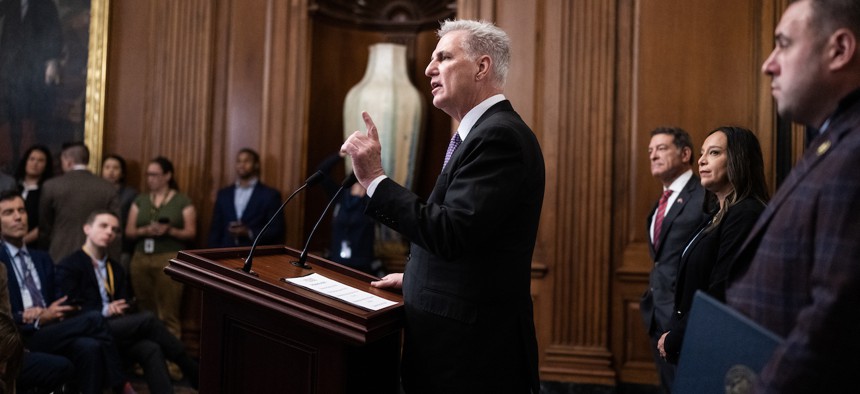
Speaker of the House Kevin McCarthy, R-Calif., conducts a news conference in the U.S. Capitol on September 29, 2023. Behind him are, from left, Reps. Mark Green, R-Tenn., Monica De La Cruz, R-Texas, and Anthony D'Esposito, R-N.Y. Tom Williams/CQ-Roll Call, Inc via Getty Images
House fails to advance spending stopgap, pushing government to the brink of a shutdown
Senate will still attempt 11th-hour plan that faces uncertain future.
Updated at 2:55 p.m. ET
The House on Friday failed to pass a short-term spending bill that would have punted a shutdown for one month, bringing Congress to the edge of a funding lapse that could delay paychecks for millions of federal employees.
The legislative hopes for averting a shutdown now rest with the Senate, which is expected to vote on its own stopgap funding bill by Saturday. Whether House Republican leadership would bring that measure up for a vote remains unclear, though it is unlikely to do so without amending the bill in a way that would make it unpalatable for the Democratically controlled Senate.
The House’s continuing resolution would have extended funding through Oct. 31, while requiring increased border security measures and more restrictive immigration policies. It would have cut funding for the duration of the bill by around 8% for non-defense, non-Veterans Affairs Department spending. The House narrowly passed a “rule” governing the debate of the spending measure, but not the bill itself. Ultimately, it was narrowly defeated after a small group of conservatives joined all Democrats in voting against it.
House Speaker Kevin McCarthy, R-Calif., had sought to pass the measure, which would have been dead on arrival in the Senate, to increase his caucus’ leverage in negotiations over a path forward. Ahead of the vote, his leadership team attempted to convince Republicans the measure would meet the goals of their caucus.
“By passing a continuing resolution through the next month, Congress can keep the government open while incorporating border-related reforms to address the crisis at our border and protect American citizens,” said House Majority Leader Steve Scalise, R-La.
The House will likely now await the outcome of the Senate, where Republicans are looking for a bipartisan amendment to tack on extra border funding and other reforms to their CR. That measure, which would keep funding flat at fiscal 2023 levels through Nov. 17, has cleared two preliminary votes this week with broad bipartisan support. Border security measures on the CR could make the measure more palatable for the House, but McCarthy has yet to commit to bringing the bill up for a vote if it passes in the Senate.
Whether the Senate can deliver the measure to the House in time to avert a shutdown also remains in question, as such an expedited timeline in the upper chamber would require unanimous consent. On Thursday, Senate Majority Leader Chuck Schumer, D-N.Y., said he would set up another preliminary vote on Saturday if there is no agreement to act sooner. The non-expedited timeline would force agencies to shut down before the Senate can take a final vote.
In the meantime, the Biden administration has ramped up its preparations for a shutdown. The Office of Management and Budget is working with agencies to finalize their contingency plans, laying out exactly who would get sent home on furlough and what work would continue. Agencies have already begun notifying staff through that a shutdown is looming and are will send out official furlough notices if a shutdown occurs.
OMB Director Shalanda Young on Friday castigated House Republicans for failing to comply with a deal McCarthy struck with President Biden earlier this year that raised the debt ceiling and set spending levels for fiscal years 2024 and 2025. She added she worried a shutdown would cause people to lose their faith in government and have a dramatic impact on government employees.
"I know it's not popular to defend federal workers," Young said. "I know it's not, but a lot of them live paycheck to paycheck."







